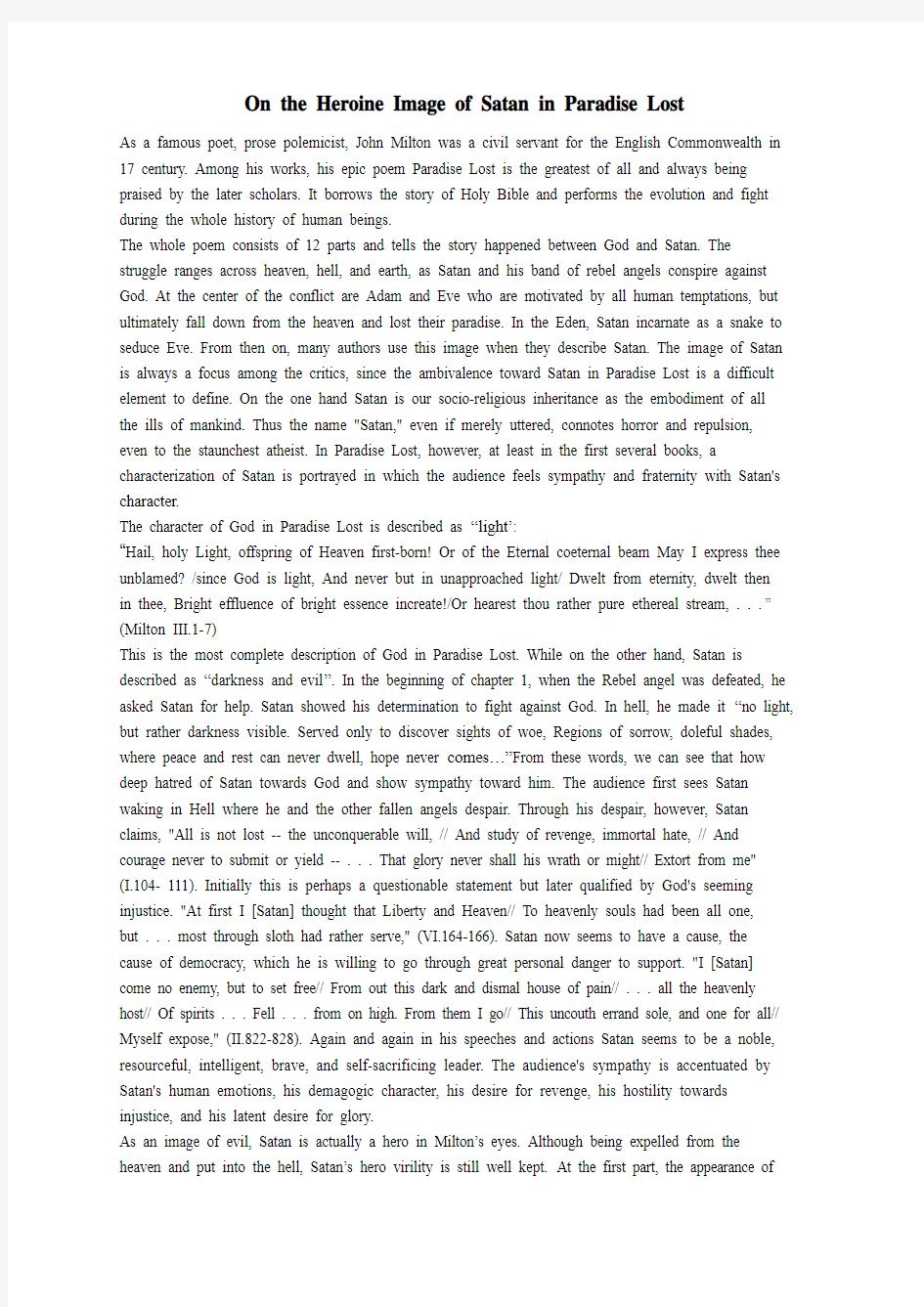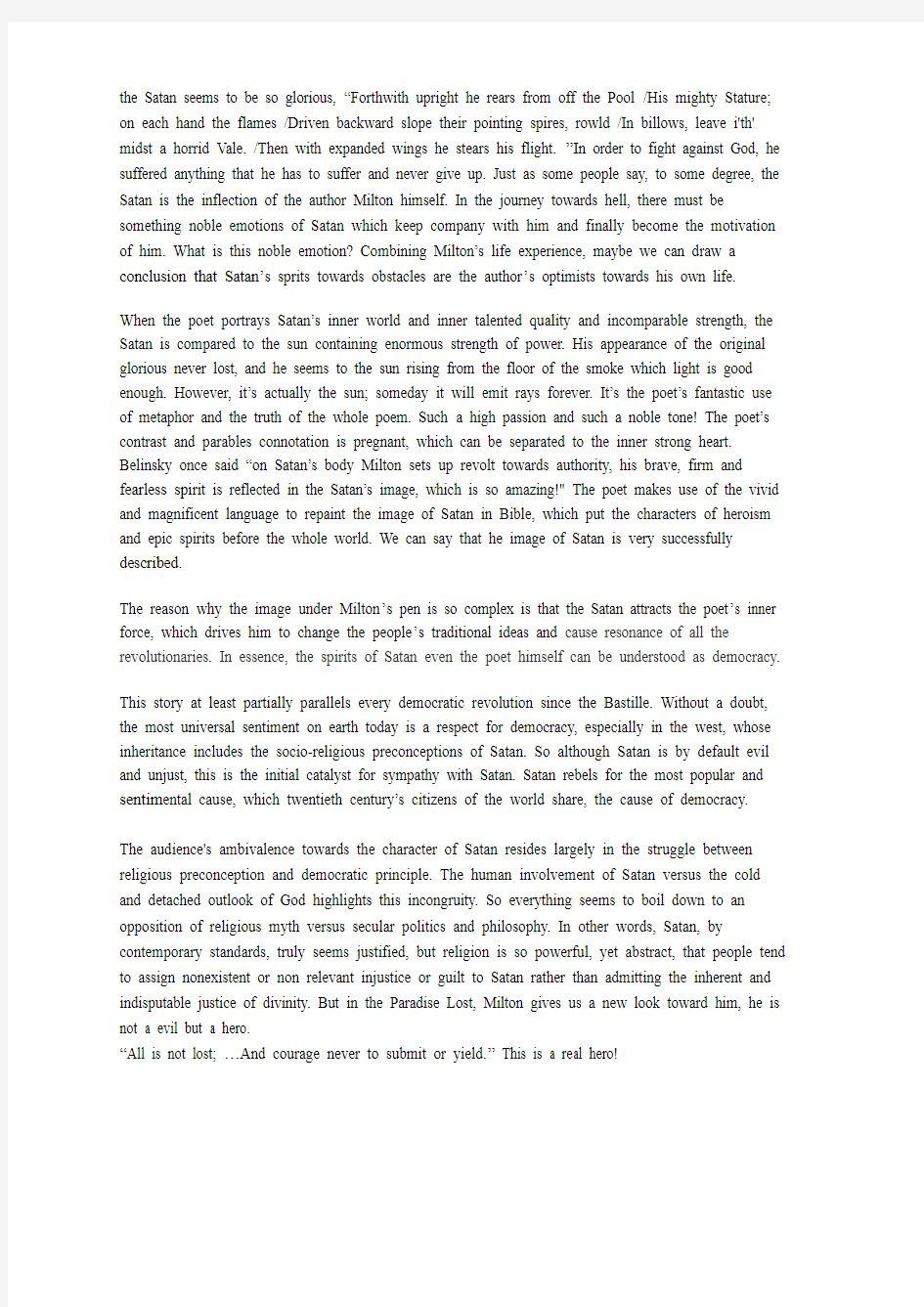The_Heroine_Image_of_Satan_in_Paradise_Lost


On the Heroine Image of Satan in Paradise Lost
As a famous poet, prose polemicist, John Milton was a civil servant for the English Commonwealth in 17 century. Among his works, his epic poem Paradise Lost is the greatest of all and always being praised by the later scholars. It borrows the story of Holy Bible and performs the evolution and fight during the whole history of human beings.
The whole poem consists of 12 parts and tells the story happened between God and Satan. The struggle ranges across heaven, hell, and earth, as Satan and his band of rebel angels conspire against God. At the center of the conflict are Adam and Eve who are motivated by all human temptations, but ultimately fall down from the heaven and lost their paradise. In the Eden, Satan incarnate as a snake to seduce Eve. From then on, many authors use this image when they describe Satan. The image of Satan is always a focus among the critics, since the ambivalence toward Satan in Paradise Lost is a difficult element to define. On the one hand Satan is our socio-religious inheritance as the embodiment of all the ills of mankind. Thus the name "Satan," even if merely uttered, connotes horror and repulsion, even to the staunchest atheist. In Paradise Lost, however, at least in the first several books, a characterization of Satan is portrayed in which the audience feels sympathy and fraternity with Satan's character.
The character of God in Paradise Lost is described as “light’:
“Hail, holy Light, offspring of Heaven first-born! Or of the Eternal coeternal beam May I express thee unblamed? /since God is light, And never but in unapproached light/ Dwelt from eternity, dwelt then
in thee, Bright effluence of bright essence increate!/Or hearest thou rather pure ethereal stream, . . .” (Milton III.1-7)
This is the most complete description of God in Paradise Lost. While on the other hand, Satan is described as “darkness and evil”. In the beginning of chapter 1, when the Rebel angel was defeated, he asked Satan for help. Satan showed his determination to fight against God. In hell, he made it “no light, but rather darkness visible. Served only to discover sights of woe, Regions of sorrow, doleful shades, where peace and rest can never dwell, hope never comes…”From these words, we can see that how deep hatred of Satan towards God and show sympathy toward him.The audience first sees Satan waking in Hell where he and the other fallen angels despair. Through his despair, however, Satan claims, "All is not lost -- the unconquerable will, // And study of revenge, immortal hate, // And courage never to submit or yield -- . . . That glory never shall his wrath or might// Extort from me" (I.104- 111). Initially this is perhaps a questionable statement but later qualified by God's seeming injustice. "At first I [Satan] thought that Liberty and Heaven// To heavenly souls had been all one,
but . . . most through sloth had rather serve," (VI.164-166). Satan now seems to have a cause, the cause of democracy, which he is willing to go through great personal danger to support. "I [Satan] come no enemy, but to set free// From out this dark and dismal house of pain// . . . all the heavenly host// Of spirits . . . Fell . . . from on high. From them I go// This uncouth errand sole, and one for all// Myself expose," (II.822-828). Again and again in his speeches and actions Satan seems to be a noble, resourceful, intelligent, brave, and self-sacrificing leader. The audience's sympathy is accentuated by Satan's human emotions, his demagogic character, his desire for revenge, his hostility towards injustice, and his latent desire for glory.
As an image of evil, Satan is actually a hero in Milton’s eyes. Although being expelled from the heaven and put into the hell, Satan’s hero virility is still well kept. At the first part, the appearance of
the Satan seems to be so glorious, “Forthwith upright he rears from off the Pool /His mighty Stature; on each hand the flames /Driven backward slope their pointing spires, rowld /In billows, leave i'th' midst a horrid Vale. /Then with expanded wings he stears his flight. ”I n order to fight against God, he suffered anything that he has to suffer and never give up. Just as some people say, to some degree, the Satan is the inflection of the author Milton himself. In the journey towards hell, there must be something noble emotions of Satan which keep company with him and finally become the motivation of him. What is this noble emotion? Combining Milton’s life experience, maybe we can draw a conclusion that Satan’s sprits towards obstacles are the author’s optimists towards his own life.
When the poet portrays Satan’s inner world and inner talented quality and incomparable strength, the Satan is compared to the sun containing enormous strength of power. His appearance of the original glorious never lost, and he seems to the sun rising from the floor of the smoke which light is good enough. However, it’s actually the sun; someday it will emit rays forever. It’s the poet’s fantastic use of metaphor and the truth of the whole poem. Such a high passion and such a noble tone! The poet’s contrast and parables connotation is pregnant, which can be separated to the inner strong heart. Belinsky once said “on Satan’s body Milton sets up revolt towards authority, his brave, firm and fearless spi rit is reflected in the Satan’s image, which is so amazing!" The poet makes use of the vivid and magnificent language to repaint the image of Satan in Bible, which put the characters of heroism and epic spirits before the whole world. We can say that he image of Satan is very successfully described.
The reason why the image under Milton’s pen is so complex is that the Satan attracts the poet’s inner force, which drives him to change the people’s traditional ideas and cause resonance of all the revolutionaries. In essence, the spirits of Satan even the poet himself can be understood as democracy.
This story at least partially parallels every democratic revolution since the Bastille. Without a doubt, the most universal sentiment on earth today is a respect for democracy, especially in the west, whose inheritance includes the socio-religious preconceptions of Satan. So although Satan is by default evil and unjust, this is the initial catalyst for sympathy with Satan. Satan rebels for the most popular and sentim ental cause, which twentieth century’s citizens of the world share, the cause of democracy.
The audience's ambivalence towards the character of Satan resides largely in the struggle between religious preconception and democratic principle. The human involvement of Satan versus the cold and detached outlook of God highlights this incongruity. So everything seems to boil down to an opposition of religious myth versus secular politics and philosophy. In other words, Satan, by contemporary standards, truly seems justified, but religion is so powerful, yet abstract, that people tend to assign nonexistent or non relevant injustice or guilt to Satan rather than admitting the inherent and indisputable justice of divinity. But in the Paradise Lost, Milton gives us a new look toward him, he is not a evil but a hero.
“All is not lost; …And courage never to submit or yield.” This is a real hero!
